The Dream
For me, one of the most startling and moving passages in Crime and Punishment comes in Part One, Chapter Five. Wandering around St.Petersburg, contemplating the murder of pawnbroker Alyona Ivanonva, Raskolnikov falls into a vodka-induced sleep and dreams a scene loosely from his childhood. He is walking through the town with his father and they come across a tavern. Some sort of “festivity” is going on. Upon closer inspection, they find that a group of drunken tavern-goers, led by a man named Mikolka, are climbing into a cart led by an aging horse, wanting it to give them a ride. It’s clear the horse can’t carry this many people. When the mare indeed fails to pull the cart, the crowd rises into a mocking laughter and Mikolka starts to beat the horse. The young Raskolnikov looks on horrified, even when his father urges him not to. The scene escalates and eventually the entire crowd is mercilessly, mockingly beating the horse.
“She’ll fall in a minute, pals, you’ll see, and that’s the end of her!” shouts an admiring spectator. “Get an axe, hell! Finish her off,” shouts a third…”Finish her off,” shouts Mikolka and, beside himself, leaps out of the cart. Several young men, also red and drunk, seize anything they come across–whips, sticks, poles and run to the dying mare. Mikolka stands on one side and begins dealing random blows to her back with the crowbar. The mare stretches out her muzzle, draws a long breath and dies” (59).
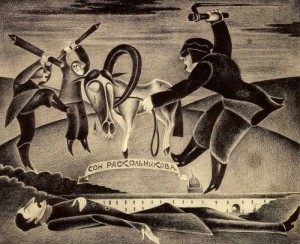
Mikhail Shemyakin, Raskolnikov’s Dream, illustration to “Crime and Punishment” by Fyodor Dostoevsky, 1964. Pencil on paper.
A Few Interpretations
This passage of course hints at Raskolnikov’s extreme anxiety about the murder he is premeditating. Alyona Ivanovna, the dishonest, immoral pawnbroker, the “parasite” on society that Raskolnikov wishes to eradicate for the greater good, the moral scapegoat symbolized by the horse–Dostoevsky’s exploration of the logical conclusions of a utilitarian ethical system. (The parasites must die so society can live). We can also see Raskolnikov himself in the figure of the horse: at points in his mental rationalization of the murder, he justifies his deed as the ironic Christ-like figure doing the “dirty work” of saving humanity and having to suffer the price for it. Perhaps it says something about the dangers of mob psychology, of how quickly a little carousing can spiral into barbaric violence. Dostoevsky certainly doesn’t hide what he thinks of Russian society here.
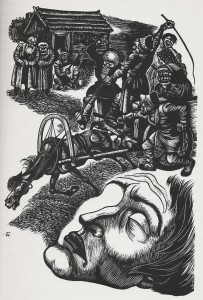 |
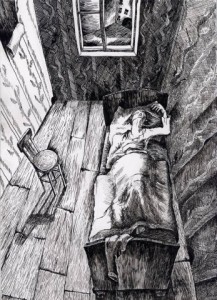 |
Raskolnikov’s Deepest Fears
I think these are all legitimate views. But there was one thing that struck me on a third reading: the dream sequence goes on so damn long. It takes five pages of beating and thrashing for the horse to die and for Raskolnikov to wake up. One explanation could be that Dostoevsky had to meet a page or word quota, but the dream’s length hints at a quality of Raskolnikov’s anxiety about the murder that goes beyond whether he can morally justify it or not: what if it, like the poor horse dragging the cart, drags on forever? It takes several attempts for Mikolka and the crowd to “finish her off.” This is no one fell swoop, no clean swipe of the axe, no compassionate euthanasia. This is a bloody, drawn-out spectacle.
Raskolnikov’s true fear concerning the murder (both before and after he commits it) the possibility that the deed will spread beyond itself, carry on indefinitely, bleed (pun intended) into the following events. And it does. Raskolnikov wants the murder to be a clean, self-cancelling event. 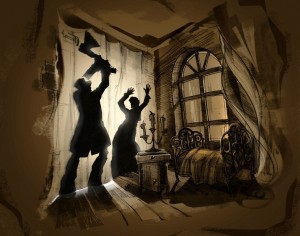 First Alyona Ivanonvna is alive, parasitically leeching off others, and the next she is dead and society is on the whole better off for it. But the whole narrative of Crime and Punishment is an elaborate illustration that this is not the case. First, much like the dream, it takes several swipes of the axe for Raskolnikov to really make sure Alyona Ivanovna is dead. Then he’s forced to kill her sister Lizaveta who unfortunately walks in on the scene. And much of the rest of the novel is Raskolnikov’s inner battles over whether or not this was the right thing to do, whether or not he should confess, even finding himself lured by the prospect. Even in his own psyche, the murder has bled beyond itself into this purgatorial half-dead state. The only way to “finish her off” is to turn himself in.
First Alyona Ivanonvna is alive, parasitically leeching off others, and the next she is dead and society is on the whole better off for it. But the whole narrative of Crime and Punishment is an elaborate illustration that this is not the case. First, much like the dream, it takes several swipes of the axe for Raskolnikov to really make sure Alyona Ivanovna is dead. Then he’s forced to kill her sister Lizaveta who unfortunately walks in on the scene. And much of the rest of the novel is Raskolnikov’s inner battles over whether or not this was the right thing to do, whether or not he should confess, even finding himself lured by the prospect. Even in his own psyche, the murder has bled beyond itself into this purgatorial half-dead state. The only way to “finish her off” is to turn himself in.
Dostoevsky, Fyodor. Crime and Punishment. Translated by Constance Garnett, 1914. Translation revised by Juliya Salkovskaya and Nicholas Rice .
********
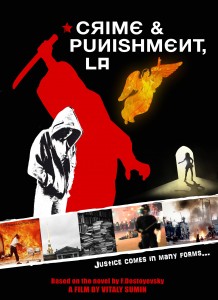 VM Productions is happy to announce our project in active development titled Crime and Punishment, LA, the third film of our ambitious Dostoyevsky-LA Project (following the multiple award winners Shades of Day & Notes From the New World). Crime & Punishment, LA represents – a re-envisioning of Dostoyevsky’s classic novel transported to Los Angeles during the riots of 1992.
VM Productions is happy to announce our project in active development titled Crime and Punishment, LA, the third film of our ambitious Dostoyevsky-LA Project (following the multiple award winners Shades of Day & Notes From the New World). Crime & Punishment, LA represents – a re-envisioning of Dostoyevsky’s classic novel transported to Los Angeles during the riots of 1992.
The script has made it to the top 8 for the European Co-Production Matchmaking Program, which was featured during the 2017 panel of the prestigious South by Southwest International Film Festival.
Want to know about VM Productions‘ Dostoyevsky-Los Angeles Project and about the films we make? Want to participate in our projects? Sign up to get tickets to the premiere of our movie (currently in post production), Dostoyevsky Reimagined-BTS and
grab our FREE e-books !
 |
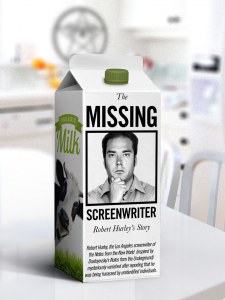 |
 Follow us through our social media on
Follow us through our social media on
Twitter, Facebook, Google+, Pinterest, Tumblr, Instagram, Goodreads.
Edited (& the visual material – fair use) by Kate Panney & VM Productions

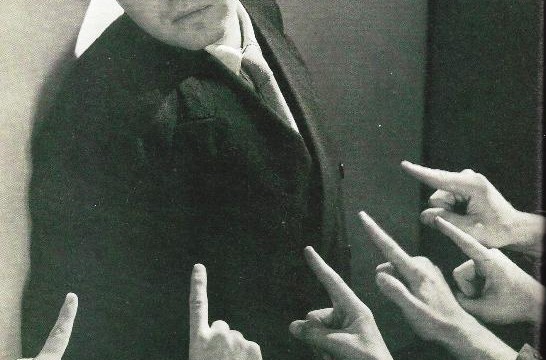
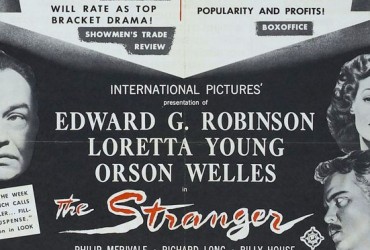
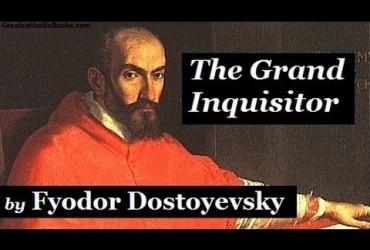
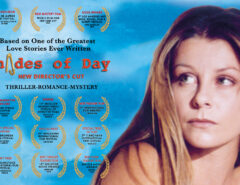
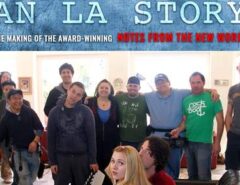
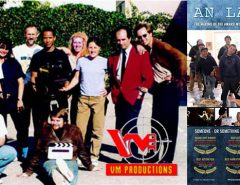
1 Comment